 Abraham Lincoln
If given the truth, the people can be depended upon to meet any national crisis...
Abraham Lincoln
If given the truth, the people can be depended upon to meet any national crisis...
 Guildford news...
for Guildford people, brought to you by Guildford reporters - Guildford's own news service
Guildford news...
for Guildford people, brought to you by Guildford reporters - Guildford's own news service
Opinion: Election Reflections – Martin Giles
Published on: 17 May, 2015
Updated on: 8 Mar, 2017
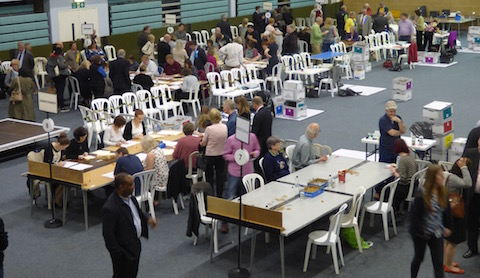
The borough council election count underway into the early hours of Saturday morning, May 9th, at Spectrum Sports Centre.
Am I the only one feeling a sense of post election anticlimax?
We had been told for weeks that we were truly in a multi-party scenario, that the mould was definitely, this time, being broken.
Smaller and larger parties were everywhere working out their “red lines” for joining in with the “inevitable” coalition.
But instead we are back to “normal”, one of the main two parties is in power with a small majority, much as it often was in the 60s and 70s or with John Major’s government of the 90s.
What was inevitable was that Guildford would be on the sidelines of any national campaign. Guildford was no longer the Lib Dems’ No. 1 target seat as it was in 2010. Anne Milton, a conscientious constituency MP, was a dead cert to win here, so the local general election campaign never really took off and Guildford’s Conservative campaigning resources were sent out to help elsewhere, where results were in doubt.
This feeling of exclusion must be shared in safe seats across the country. All the attention was on the marginals where many voters forgot any philosophical principles to simply vote tactically against the party they hated most.
The collapse in the Guilford Lib Dem vote from over 20,000 votes to less than 10,000 went beyond most expectations. And now after delivering a kick to the groin some want to hug them again and say they didn’t really mean it.
We hear that there is a surge in Lib Dem recruitment nationally and it has been noticed here in Guildford too. Thousands across the country have rushed to join up, hundreds of them here in Guildford, feeling guilty that they have given the party they usually support such a cruel kicking for daring to share power with the Tories.
But, despite the utter iniquity of just two MPs, one each from UKIP and the Green Party, representing between them over 5 million voters while the SNP’s 56 MPs represent just 1.5 million, the first past the post system is unlikely to change. Why would the Conservative turkeys vote for Christmas?
No, we will we ruled by a party that obtained support from a little over one third of those that voted but will doubtless claim to have a mandate to do, more or less, whatever they want. We should not complain though. Collectively not enough voted for change so Why should there be any.
In any case, Anne Milton secured 57% of the vote in Guildford so she can say she represents most of us, fair and square.
The same can’t be said on the borough council. With GGG eating into the Tory vote the Tories did not attract more than 50% of the votes despite the Lib Dem collapse.
If the council seats were distributed proportionally they would be, approximately: Con 24, Lib Dems 11, GGG 8; Lab 5. Instead they are Con 35, Lib Dems 9, GGG 3; Lab 1.
So the Conservative domination at Millmead has increased slightly with concerns over national issues apparently dictating how many of us vote in local elections too.
One clear example of this was given by the Independent candidate in Stoughton, Tony Ferris. When out door knocking he came across a resident who told him in no uncertain terms that he was voting for UKIP.
Tony politely pointed out that he was campaigning in the local, not the general, election but was told, “I’m still voting UKIP.” Finally, he pointed out that there was, in fact, no UKIP candidate actually standing in the ward. “I don’t care, I’m still voting UKIP!” the voter insisted.
 A Westborough voter asked why Ed Milliband’s name was not on the ballot paper. Another that he was voting in the local election to keep Milliband out. Others even questioned why they had been given two ballot papers. Enough said.
A Westborough voter asked why Ed Milliband’s name was not on the ballot paper. Another that he was voting in the local election to keep Milliband out. Others even questioned why they had been given two ballot papers. Enough said.
But if some Guildford voters did not know what they were voting for in the local election, wasn’t it equally silly for GGG to stand in the general election? I felt a bit sorry for Susan Parker as her 500 vote total was announced. She faced some cruel laughter from some of Anne Milton’s lieutenants but was it really wise of her to put herself forward?
Despite failing to secure re-selection to stand as a candidate for her Burpham seat, Monika Juneja still managed to steal a headline or two even as polling was underway.
The wisdom of engaging in politics, even in a minor way by raising a petition, with an imminent court case pending must be questionable. Even party colleagues confided that they considered her activity embarrassing, if not bizarre.
Monika has always possessed a full quota of self confidence but I think most people would consider it advisable to keep a lower profile at such a time.
The Monika story was just one of the topics of conversation among those whiling away the hours during the election count. They seemed interminable. Many will remember when Guildford was the first to declare in 1970 (Ken Livingstone does, it presaged the Labour defeat and he admits that he has hated Guildford ever since) but there was no such expectation this time round.
The coincidence of the general and local elections slowed things up. Correct delivery of the ballot boxes to the right count venues is obviously very important and, because parliamentary constituency boundaries and borough council boundaries are not at all the same, different boxes had different destinations.
Nonetheless, many of the councillor’s themselves were questioning the efficiency of the process and, while accuracy must always take precedence, perhaps a review of the process in Guildford is necessary.
I was left wondering why it is that we so determinedly stick to a paper system here in the UK in an age when most of us happily entrust online banking.
There is no extra security in paper, far from it, especially while we have so many postal votes. More up to date, convenient ways of voting could help the greater engagement in politics that many of us yearn.
There were several complaints during the count from the GGG types present. They were the newbies but, quite rightly, determined not to be intimidated.
I thought that they could have been a little more relaxed. We are very fortunate in Guildford, and in Britain generally, to have civil servants and volunteers whose integrity can, almost without exception, be relied upon.
The Guildford Dragon has already opined on the subject of “paper candidates“. I subsequently had a senior member of local Tories ring to complain that we had got it all wrong, the Conservatives did not put paper candidates up for election. What utter tosh.
In this week of all weeks Guildford Tories must start admitting the truth. But in a way we are all to blame for tolerating a system so badly affected by the vagaries of national party politics.
If evidence were needed of the malign influence, Stoughton Ward count is an example. Pauline Searle, a dedicated servant of her constituents for many years who happens to be a Liberal Democrat, was, seeing the ballot papers stack up, fearful that she was going to lose her seat.
It seemed a harsh judgement passed by many who normally could probably not even name their local councillors let alone assess their likely performance.
So who stepped up to put his arm around Pauline and offer support? None other than Nigel Manning a Conservative councillor from Ash Vale.
Why did he do it? I think it was the kind act of a friend and a fellow councillor who understands what time is spent and what efforts are made by councillors like Pauline, the act of someone who appreciates how hurtful and unfair it can be to be thanklessly rejected.
It encapsulated how ridiculous the party system can be and how even those within it seem to appreciate that it is more important to have a hard-working, caring councillor than one of any particular party loyalty.
Happily Pauline Searle was returned following the recount on Monday and the residents of Stoughton will continue to have her as a caring representative.
With the election done we can look forward to a lively time on the Borough Council. The Local Plan should dominate the show but the aftermath of Monika Juneja’s court case will cast a shadow. It might even emerge as an issue at next Tuesday’s (May 19) full council meeting where a council leader is to be elected. We don’t have long to wait.
What are your reflections of the elections both general and local? Your views are just as important. Please use the “Leave a Reply” feature below to have your say.
Responses to Opinion: Election Reflections – Martin Giles
Leave a Comment Cancel replyPlease see our comments policy. All comments are moderated and may take time to appear. Full names, or at least initial and surname, must be given.
Recent Articles
- Notice: The Welcoming Committee for Hong Kongers
- Letter: This Shows Why Councils Should Not Dabble in Property Investment
- GBC Dismisses Fears That New Ash Road Bridge Will Cause Traffic ‘Bottleneck’
- Marking Holocaust Memorial Day 2025 at the Surrey History Centre
- Surrey Councils Call on Residents to Recycle All Their Food Waste
- Windfall Grant Allows High Street Redevelopment Project to Proceed
- New Crossing at Burpham
- Young Councillor Quits Tories for Reform
- Surrey Police Crackdown Shows Serious Rise In Drug-Driving
- Letter: Too Many Years Have Been Lost Awaiting This Decision


Recent Comments
- Paul Spooner on Windfall Grant Allows High Street Redevelopment Project to Proceed
- David Roberts on Letter: Shaping Guildford’s Future and Meeting the New Housing Uplift
- Frank Ayling on Cold War Fighter Jet Collision Over Guildford
- Simon Vine on Birdwatcher’s Diary No.318 Some Pre-Christmas Rambles
- RWL Davies on County Council Elections ‘Must Go Ahead’ Say Surrey Council Leaders
- S Callanan on Letter: The National Trust Should Be Embarrassed About How Long the Weir Repair Is Taking
Search in Site
Media Gallery
Dragon Interview: Local Artist Leaves Her Mark At One of England’s Most Historic Buildings
January 21, 2023 / No Comment / Read MoreDragon Interview: Lib Dem Planning Chair: ‘Current Policy Doesn’t Work for Local People’
January 19, 2023 / No Comment / Read MoreA3 Tunnel in Guildford ‘Necessary’ for New Homes, Says Guildford’s MP
January 10, 2023 / No Comment / Read More‘Madness’ for London Road Scheme to Go Ahead Against ‘Huge Opposition’, Says SCC Leader
January 6, 2023 / No Comment / Read MoreCouncillor’s Son Starts Campaign for More Consultation on North Street Plan
December 30, 2022 / No Comment / Read MoreCounty Council Climbs Down Over London Road Works – Further ‘Engagement’ Period Announced
December 14, 2022 / No Comment / Read MoreDragon Interview: GBC Reaction to the Government’s Expected Decision to Relax Housing Targets
December 7, 2022 / No Comment / Read MoreHow Can Our Town Centre Businesses Recover? Watch the Shop Front Debate
May 18, 2020 / No Comment / Read More




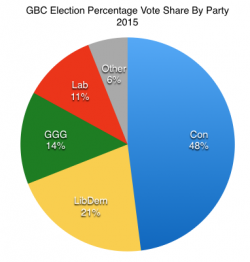
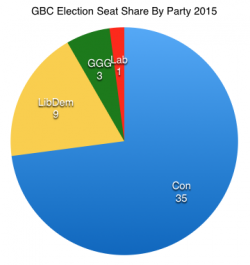
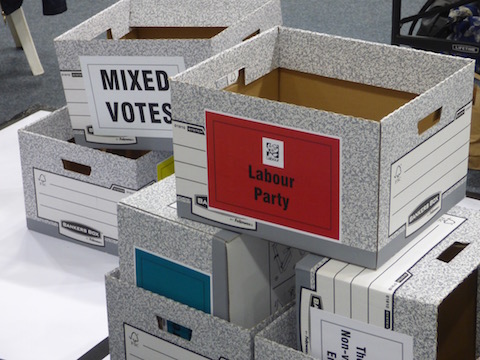
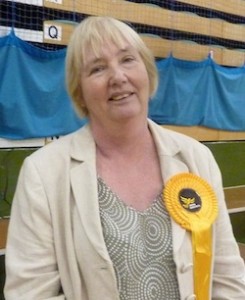







Jim Allen
May 17, 2015 at 12:57 pm
We already have a system in place throughout the country which could easily be used for elections and referendums.
Its the National Lottery system. It would be oh so simply to sign in and place your slip into the Lotto Machine – the electronics and the software are all in place. It would take seconds to modify the back end to do a rapid count – even of electors wishes.
As someone said to me about building on the flood plain, ‘Its only engineering.’
Sorry – that is just too simple.
Lisa Wright
May 17, 2015 at 2:23 pm
I personally corrected two mistakes at the local election count, one a mathematical error and the second where a ballot paper was put in the wrong pile. So, GGG candidates were quite right in pointing out errors and making sure the law was followed correctly.
I think it’s fair to say not many of the regular party candidates were paying much attention to the sorting of ballot papers until it came to the final counts. As the article implies, they are happy for the paid help to get on with it but it should be remembered that humans make errors, especially when they’ve been sitting in the same chair for ten hours.
George Potter
May 17, 2015 at 4:00 pm
Something else worth noting is this: in lots of split wards the deciding factor which determined which candidate(s) from a particular party was elected was the position their name appeared on the ballot paper out of all the candidates their party was standing. This, in turn, was determined by alphabetical order.
What does it say about politics when the alphabetical order of a surname was often the deciding factor in which candidates got elected?
Nick Trier
May 17, 2015 at 9:49 pm
It is also a sad comment on the state of politics in Guildford that any candidate with a slightly foreign looking surname gets fewer votes than party colleagues with traditional “English” names.
Jim Allen
May 18, 2015 at 9:46 am
If I as an Englishman of 15 generations wish to select my representative because he or she has a traditional English name – then why should you consider it ‘sad’ if I prefer to vote for my own countrymen.
Nick Trier seems to take exception that English people vote for English candidates. But why shouldn’t we English do, what the French, Germans, Swedish and Spanish do, which is to vote for their own countrymen.
I realise that the common view these days is that the English should never be in the majority in their own country ‘England’, according to everyone else anyway.
This open hatred of the English by those who choose to come and live in my country really worries me.
David Bilbé
May 18, 2015 at 10:32 am
A very interesting comment from Nick Trier. My name is French – my Grandfather was from Marseilles – it looks and sounds decidedly foreign.
That seemed to be little deterrent to securing a huge majority swing for the village of Normandy – increasing the majority by 635.
David Bilbé is the newly elected Conservative councillor for Normandy ward.
David Wragg
May 18, 2015 at 6:47 pm
Ensuring that ballot papers are in the right pile at the election count is down to the party agents, so there should be no need for panic.
‘First past the post’ is not perfect, but it does retain the link between constituency parties and the candidates, while proportional representation means that candidates are chosen if not actually in secret but in less open circumstances. The risk of coalition government is vastly increased by proportional representation, which means that hardy anyone gets the government they voted for.
In Germany, proportional representation ignores any party that polls less than 5 per cent of the total ballot. This is to avoid special interest groups getting into government. If adopted here, it would have meant that the SNP would have not been represented in Parliament, so there is perhaps something to be said for it!